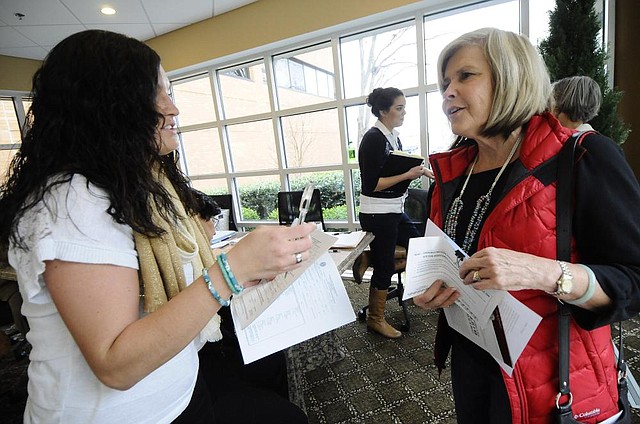Cherokee Nation hands out new ID cards to Arkansans
NWA Media/Marc F. Henning Terrisa Muskrat, left, Cherokee Nation special assistant for government relations, greets Pamela Cagle of Bella Vista on Saturday, Feb. 9, 2013, during an outreach visit by Cherokee Nation representatives to the Center For Non-Profits in Rogers. The visit, one of several planned outreaches for Cherokee citizens in western Arkansas communities, gave Cherokee tribal citizens the chance to upgrade their ID cards and register to vote in upcoming tribal elections. Cagle, whose Cherokee heritage comes from her father's side, said she attended the event to upgrade her old tribal citizenship card to a new photo ID. The next Cherokee Nation outreach in Northwest Arkansas will be on March 2 at the University of Arkansas Law School in Fayetteville.
Sunday, February 10, 2013
Dozens of Arkansas residents obtained new Cherokee Nation photo identification citizenship cards Saturday in Rogers.
Representatives from the Cherokee Nation will continue issuing the new plastic cards today in VanBuren. Additional events are planned for Feb. 16 in Fort Smith and March 2 in Fayetteville.
In addition to the ID cards, the Cherokee Nation is working to generate interest in establishing a community organization for Cherokees living in Arkansas, Principal Chief Bill John Baker said.The nation has 22 community organizations around the country.
Of the 300,000 citizens of the Cherokee Nation, 10,371 live in Arkansas, according to the nation’s registration records.
When Baker visits with Cherokee Nation citizensaround the country, it doesn’t take long to find a family connection, he said.
“It doesn’t matter where you live,” he said. “You’re still family.”
The Cherokee Nation began issuing the new tribalcitizenship cards in October. Obtaining a card requires proof of identity, an existing citizenship card and a Certificate of Degree of Indian Blood, an official U.S. document that certifies an individual has a certain degree of Indian blood of a federally recognized Indian tribe.
States and the federal government must accept the Cherokee Nation ID card as an official form of identification, Baker said.
“It’s a matter of pride, exercising our sovereignty,” Baker said. “We pre-exist the United States of America.”
Citizenship cards allow children to participate in tournaments for American Indians and access health services provided by the Cherokee Nation, he said.
Cherokee citizens living in Northwest Arkansas are within driving distance of the nation’s eight health centers and a hospital located in eastern Oklahoma, Baker said. Tahlequah, Okla., is the capital of the Cherokee Nation.
Brent Tillery, 52, of Garfield registered as a Cherokee citizen in 1998 with the encouragement of his parents, he said. His Cherokee ancestry goes back to his great grandfather, he said.
Tillery is less than onefourth Cherokee, but as a citizen of the Cherokee Nation he would have access to the tribal government’s health services if he needed them, he said.
Nancy Qualls, 42, of Gentry went with her sister on Saturday to get one of the new ID cards. She learned about the event through Facebook. The sisters are half Cherokee.
“They just said we can use [the card] as ID for anything,” Qualls said.
Qualls said she appreciates having access to free health care through the Cherokee Nation’s hospitals and clinics, especially when money is tight.
“If it wasn’t for that, we probably couldn’t go to the doctor,” she said.
The Cherokee Nation is the federally recognized government of the Cherokeepeople. Tahlequah, a city of about 17,000, is located about 70 miles southeast of Tulsa.
The nation determines citizenship by a single standard. As stipulated by the 1975 Cherokee Nation Constitution, a citizen must document that he has an ancestor listed on what are known as the Dawes Final Rolls.
Officially known as the Final Rolls of the Citizens and Freedmen of the Five Civilized Tribes in Indian Territory, the documents list the people who were approved for membership in the Cherokee, Chickasaw, Choctaw, Creek and Seminole tribes and who chose to enroll. Enrollment in the Dawes Rolls began in 1898 and ended in 1906.
The rolls list an individual’s name, age, sex, blood degree, enrollment number and tribe.
Cherokee Nation representatives will be in Van Buren from 11 a.m. to 5 p.m. today at the Van Buren Public Library, 1409 Main St.; from 11 a.m. to 5 p.m. Saturday at the Weidman Center of the Pendergraft Health Sciences Building at the University of Arkansas at Fort Smith, 5210 Grand Ave.; and from 11 a.m. to 5 p.m. March 2 in Room 328 of the University of Arkansas School of Law, 1045 W. Maple St. in Fayetteville.
More information about the Cherokee Nation may be found at cherokee.org.
Northwest Arkansas, Pages 15 on 02/10/2013
